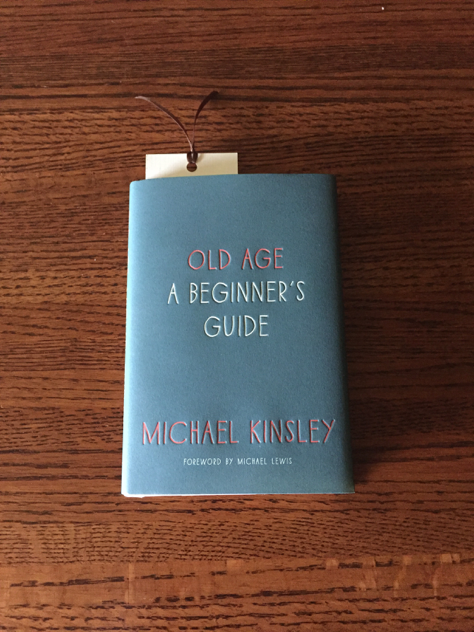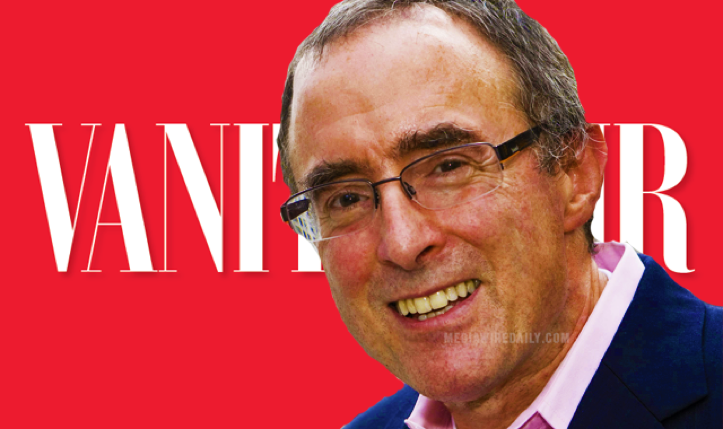
Michael Kinsley has always had a way with words. His resume’ affirms it; editor of The New Republic and Harper’s, managing editor of the The Washington Monthly, American editor of The Economist, founder of Slate, contributor to The New Yorker and a monthly columnist for Vanity Fair. It shouldn’t surprise us that he’s found a catchy, minimalist title for his new book – Old Age: A Beginner’s Guide.
I think of old age as something we come by naturally? Do we really need a “guide?” Maybe I’m in denial? Last week I reviewed Mastery: A Mission Plan for Reclaiming a Life of Purpose, Fitness, and Achievement, my friend Bob Gandt’s prescription for a meaningful, fulfilling, later in life experience. Both Gandt and Kinsley deal with the same stage of life but give us different ways to look at and think about those years. I see them as bookends, complimentary ways to shake up our thinking as we close in on the finish line.
Kinsley has earned his opinions and speaks with authority on the subject of age and its options (as does Gandt). At age 43 he was diagnosed with Parkinson’s Disease. He kept it quiet for 8 years, but now at 65 he is full frontal and outspoken about the condition, which is, as he might say, everybody’s condition – that of being mortal. What sets him apart is that he has been considering his mortality and its consequences for the past 22 years while the rest of us were getting ready for retirement, planning to learn a new language, train for an Ironman, or start the Great American Novel. How do we handle the coming years? Is there a prescription? Who’s right?
I’m going with both. We need to find meaning and purpose in our remaining years, but life is finite (although Kinsley has some fun with Larry Ellison’s half-billion dollar investment in the “quest for eternal life”). There’s no doubt that we need to give serious thought to what’s coming. Kinsley does it with good humor and his usual sagacity. His slim little “guide” is full of facts – some startlingly depressing – like, 35% of baby-boomers (28 of the 79 million in that category) are expected to develop Alzheimer’s or some other form of dementia. On the other hand, he is quick to point out that science is making extraordinary progress in dealing with the two chronic diseases that have historically been the primary killers of the elderly – heart disease and cancer.
This is not the first book to discuss end of life issues and as the author points out not likely to be the last. Twenty years ago Sherwin Nuland’s How We Die disabused a generation of optimists by pointing out that death is less likely to be dignified than messy. Last year Atul Gawande published Being Mortal, a meditation on how we might live better with age-related frailty and end of life issues. In his review of Being Mortal, Oliver Sachs said, “We have come to medicalize aging, frailty, and death, treating them as if they were just one more clinical problem to overcome. However, it is not only medicine that is needed in one’s declining years but life—a life with meaning, a life as rich and full as possible under the circumstances.” Insert here – Bob Gandt’s Mastery.
These books and Old Age: A Beginner’s Guide should be on every Boomer’s reading list – along with some Dave Barry, Bill Bryson, and Nora Ephron (she, speaking with authority and good humor from the grave), and so should Bob Gandt’s.
Unlike Nuland, Gawande, and Sacks, Kinsley is not a physician. He’s a writer dealing with a medical condition that moved him to confront his own mortality. But, Kinsley, the writer, is cagey and couches his mortality discussion in terms of competition. He sees “two forms of competition in the boomer death-style Olympics. There’s dying last and dying lucid. And in a really nice touch by whoever designed these games, the better you do in one, the worse you’re likely to do in the other.” Who will win the longevity sweepstakes and who will win the cognitive ones? “Unless you are extremely lucky, you won’t win both games.”
There is a lot to think about in Old Age: A Beginner’s Guide. It’s not a planning guide; there’s no invocation to prepare a will, prepay cremation services, or write your own obituary, and there are no pithy suggestions about how to disinherit greedy relatives or shun reverse mortgage salesmen. The book is a brief overview of information for the generation that used to believe “He who dies with the most toys, wins,” and an admonition, perhaps, to reconsider that wisdom.
In the early 1990’s Ridley Pearson, the mystery writer and a friend of mine, brought Michael Kinsley to my restaurant in Ketchum, Idaho, for lunch. I like writers. I’m a literary groupie at heart, and I was pleased to meet him that day. It must have been about the time he was diagnosed with Parkinson’s, and coincidentally at that time I was wearing an eye patch to cope with double vision caused by my own neuro-muscular disease, myasthenia gravis.
Last week David Brewster interviewed Michael at Town Hall in Seattle about the new book. Time and his disease have taken their toll on him physically. I’m sure he would say the same about me, but cognitively he is as incisive as ever. When we were younger I didn’t always agree with him but his writing challenged me to think differently. Today I read his column in Vanity Fair and continue to feel challenged by his perspective on issues. For example, he argues that the Supreme Court correctly decided the Citizens United campaign finance case which I find abhorrent and pernicious to the ideals of a citizen-centered democracy. Nevertheless, he does a credible job of defending the Court’s decision.

Today, as we enter the home stretch in the “death-style Olympics,” I hope Mr. Kinsley is one of those “extremely lucky” folks who wins both the longevity and cognitive sweepstakes. He deserves that kind of good luck. I hope the same for myself, my family, and all of my friends, but as he might say, all the planning and good habits in the world don’t make much difference if you get hit by a truck while you’re training for that triathlon.
So, stay alert and look both ways when you cross the road.































